
This article was co-authored by Dr Pearl Subban, Senior Lecturer in the Faculty of Education, and Fiona Marshall, Director of Equity, Diversity and Inclusion at Monash University.
As Women’s History Month draws to a close, we spotlight five exceptional women leading in academia whose work continues to shape and strengthen our university community. Through their research, leadership, and advocacy, they’re advancing knowledge and equity in powerful ways.
Each of their journeys reflects a commitment to excellence and a passion for creating lasting change. As we honour their achievements, we also reaffirm our collective responsibility to support and amplify the voices of women across all areas of academic life – this month, and every month.
Saying yes to leadership: Lessons in courage, care, and growth
Professor Allie Clemans, Deputy Vice-Chancellor (Education) and Senior Vice-President
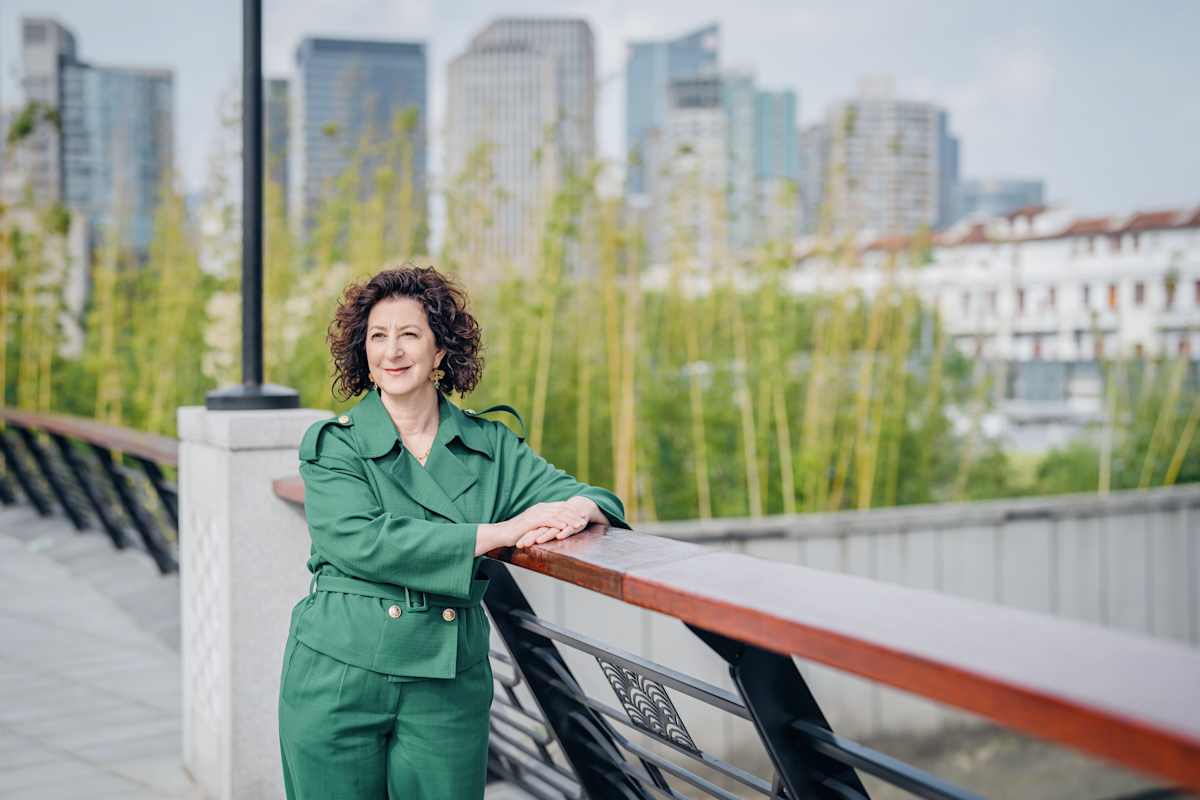
What is one defining moment in your career that shaped the way you lead today?
Some of the most defining moments in my career came early on, those unexpected times when I said “yes” to leadership. Not because everything was perfectly aligned, but because someone had stepped away, and there was a gap that needed filling. I used to chase the idea that I had to wait for the right conditions to lead – more experience, more confidence, a formal invitation. But each time I leaned in and said yes, even in the messiness of it all, new possibilities opened up. Those “yes-es” created the future I’m now living.
These days, I try to keep that same spirit. Say yes more often, stay open to growth, and trust that the learning will come (even if it’s not always wrapped in a neat little bow).
What advice would you give to women aspiring to lead in your field?
Don’t wait until you feel “ready”. That feeling may never come – and honestly, it doesn’t need to. Leadership isn’t only about holding a title; it lives in how you show up, the conversations you start, what you model, and how you bring others along.
I used to think I had to tick every box and have all the answers before stepping into a formal leadership role. But I learned, sometimes the hard way, that leadership grows with you. Readiness isn’t a prerequisite; it’s something you build through practice. So start where you are. You’re already more capable than you think.
Who is a woman who has inspired you, and why?
Rather than a single individual, I’m continually inspired by a particular way of leading. I’m drawn to brave, compassionate, principled leadership. Women who speak into discomfort with courage, who lead with heart and conviction, and who hold space for others while still holding strong to their values.
These leaders don’t just set direction – they create cultures of care and accountability. When I see women leading like that, it energises me. It reminds me that leadership can be both bold and deeply humane, and it inspires me to keep aligning my own practice with those values.
Leading with courage and purpose through mentorship and connection
Professor Ruth Jeanes, Interim Dean, Faculty of Education
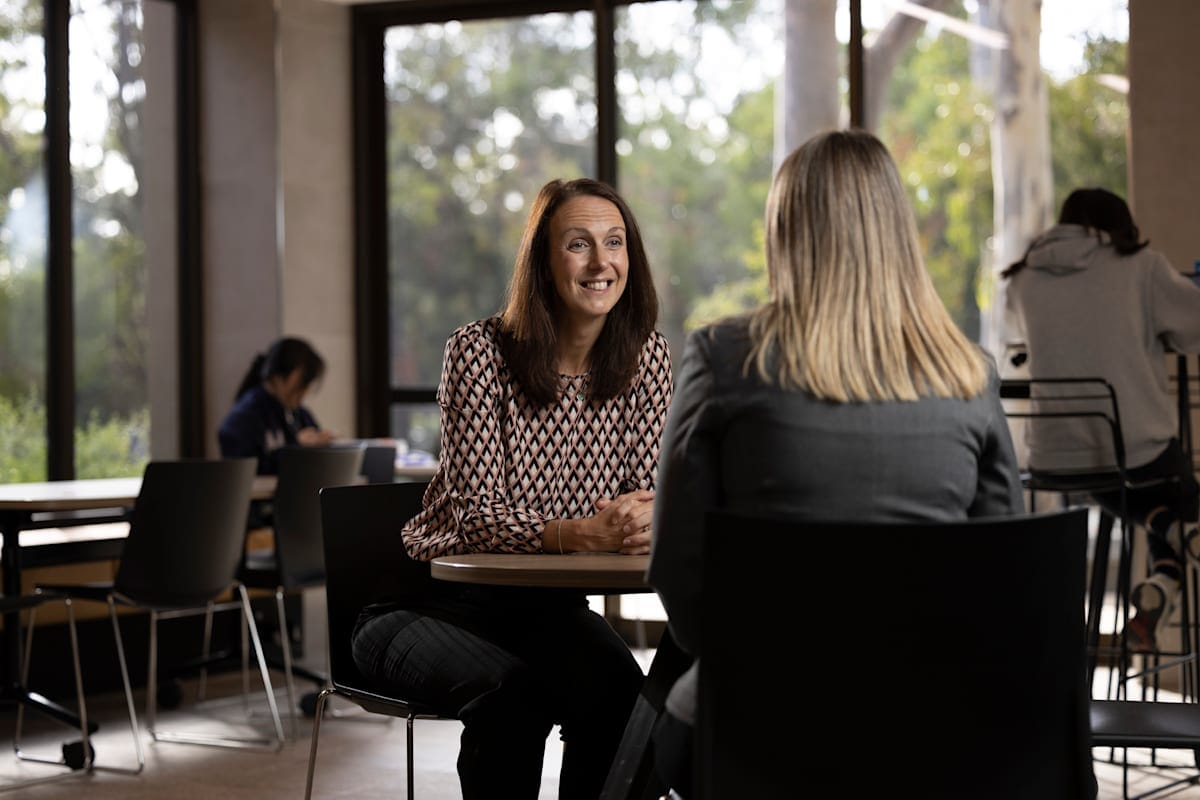
What is one defining moment in your career that shaped the way you lead today?
Stepping into the role of Director of Initial Teacher Education was a defining moment. I remember feeling completely overwhelmed – like I’d stepped into deep water without really knowing how to swim. I doubted whether I had the knowledge or experience to lead.
But over time, I realised that leadership isn’t about having all the answers. It’s about listening, adapting, and growing as you go. I gave myself permission to learn while leading, and in doing so, I became more confident and resilient.
That experience reshaped how I view leadership – it’s not about perfection, but about being open, collaborative, and grounded in purpose.
What advice would you give to women aspiring to lead in your field?
Build a strong and honest support network with other women in similar roles. Leadership can be incredibly rewarding, but also isolating and emotionally demanding. Having trusted colleagues to share experiences with, talk through challenges, and offer support can make a world of difference. Don’t be afraid to ask for help or to admit when you’re struggling – there is so much strength in vulnerability.
Seek out mentors who will champion your growth, and in turn, support other women coming up behind you. Collective leadership is powerful. When we lift each other, we all rise.
Who is a woman who has inspired you, and why?
My PhD supervisor, Professor Tess Kay, continues to be one of the most inspiring figures in my life. She’s an extraordinary feminist scholar who not only shaped my academic thinking, but also fundamentally shifted how I saw myself.
Tess encouraged me to be ambitious, to claim space in academia, and to trust in my own voice. She modelled a kind of leadership that was both courageous and deeply compassionate – always supportive, yet unafraid to challenge or push me to grow.
Her belief in me changed the trajectory of my career and continues to guide the way I lead and mentor others today.
Leading through listening: The power of shared wisdom and authenticity
Professor Ellie Fossey, Head, Department of Occupational Therapy
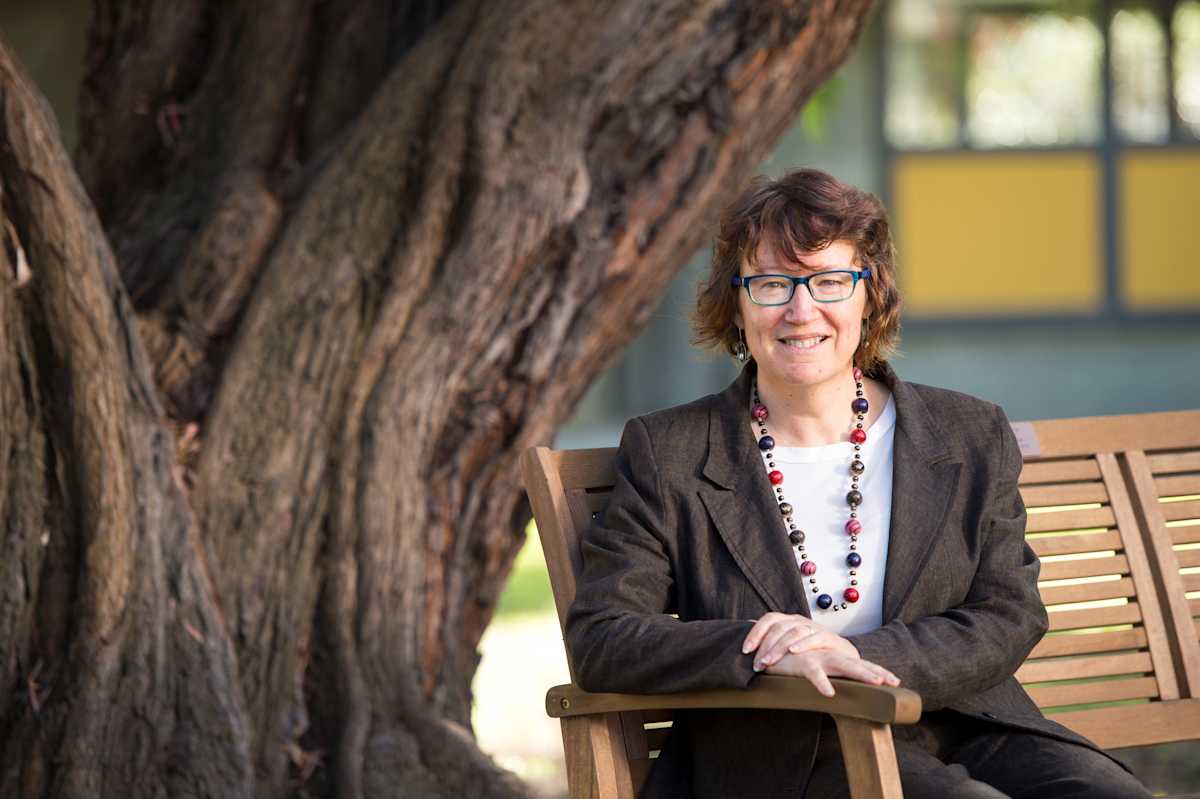
What is one defining moment in your career that shaped the way you lead today?
There have been many formative moments across my career – from working as an occupational therapist and team leader in mental health services, to stepping into academia as an educator and researcher. But one experience that truly stands out is from my PhD journey.
I set out to better-understand the everyday lives of people with mental health issues using participatory research methods that, at the time, were still relatively new in this field. Central to the project was a steering group made up of people with lived experience. Over four years, they helped guide the project’s direction and decisions.
From them, I learned so much about deep listening, holding space for differing perspectives, and sharing power in meaningful ways. These lessons have stayed with me – especially in my current roles, including collaborative initiatives like developing the University’s Disability and Accessibility Action Plan.
That experience also shaped my understanding of authentic leadership, and the importance of recognising what we don’t (and can’t) always fully know.
What advice would you give to women aspiring to lead in your field?
For me, leadership isn’t about having all the answers, it’s about creating space for others to grow, contribute, and lead alongside you. Here are a few principles that have guided me:
- Be authentic. Know your strengths and lead from them, but also take the time to notice and elevate the strengths in others. Leadership is about lifting people up, not standing alone at the front.
- Foster open dialogue and collaborative problem-solving. Be curious. Be willing to listen, to learn, and to be challenged.
- Build strong networks and mentoring relationships. These connections will support your growth, keep you grounded, and remind you that leadership is always a work in progress – we never truly “arrive”. Stay open to learning and remember, it doesn’t have to be all about you – leadership is about others too.
Who is a woman who has inspired you, and why?
One woman who continues to inspire me is Eleanor Roosevelt – appropriately, we share a name! Her role in the creation of the Universal Declaration of Human Rights was remarkable, not only because of the achievement itself, but because she brought together diverse voices and navigated complex negotiations, doing so without the benefits of modern communication tools.
The declaration remains both inspirational and subject to important critique, and the rights it outlines are still far from universally upheld. Yet I continue to admire Roosevelt’s wisdom, quiet strength, and deep commitment. If I can bring even a small measure of those qualities to my own leadership, I’ll be proud.
Rooted voices, rising leadership: Reflections on leading with purpose and community
Dr Revathi Nuggehalli Krishna, Research Fellow, Centre of Excellence for the Elimination of Violence Against Women (CEVAW)
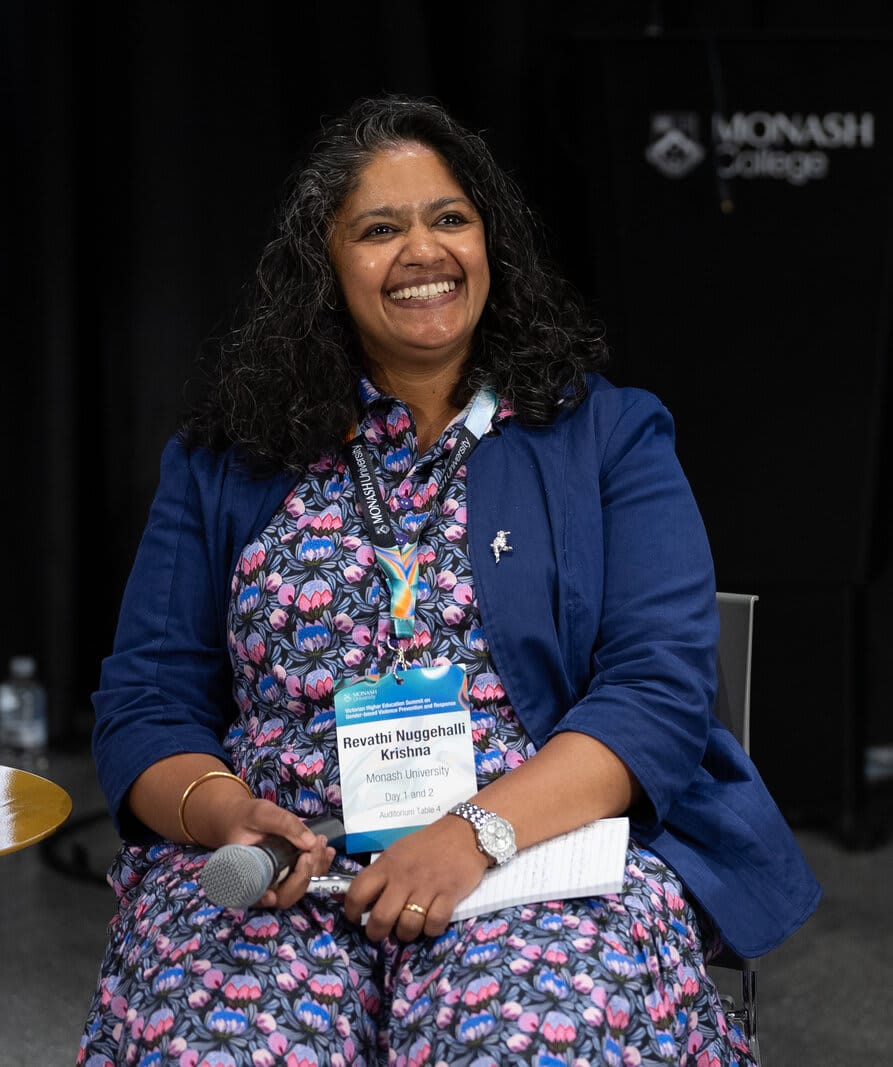
What is one defining moment in your career that shaped the way you lead today?
I’m fortunate to have had many small and big, defining moments that shape how I work and lead. One of the most impactful came during a research project in India, where I co-designed a psychosocial program for mothers experiencing perinatal depression alongside women from the community.
These women – experts through lived experience – offered a depth of understanding that far surpassed what I’d gained as a clinician in the United States or through academic training.
What struck me wasn’t just their wisdom, but how our collaboration – anchored in evidence-based practice and strong research ethics – challenged my assumptions and illuminated the richness of diverse voices.
I trained more than 30 women in the community who supported over 150 women. This was later tried in other states, and has had considerable interest to scale it into state-level health programs.
The potential scale of these programs struck me. I saw this again in my PhD work where young people in disaster-prone communities co-created solutions to floods and cyclones, proving their expertise despite being routinely overlooked.
This work also garnered interest from local and state governments for implementation in public schools. The potential scale for impact again – when you listen deeply to the community you are working with.
These moments taught me that leadership begins with humility and openness, listening deeply to participants as knowledge holders – not just as subjects – and allowing their truths to shape ethical, impactful inquiry.
Today, I lead by centring those voices, blending their expertise with research evidence to drive change – a practice rooted in that humbling moment in India.
Another crucial way I lead is to highlight scholars and research from resource-constrained settings, since great science thrives in these settings, too.
What advice would you give to women aspiring to lead in your field?
Just as it takes a village to raise a child, it takes a village to shape a thoughtful researcher and leader. My advice? Find your village. Seek mentors whose wisdom lifts you, and colleagues whose courage steadies you.
You’ll stand taller on the shoulders of mentors who guide you, alongside peers who challenge and inspire you, and mentees whose growth sharpens your own ability to lead.
Building this community takes time, patience – and, yes, the occasional bruise to your pride or heart. But, like scraped knees in childhood, those moments build resilience and equip you for the road ahead. In a field that can be emotionally demanding, your village becomes your anchor – a diverse network to sustain and amplify you.
Lean into it. Let it propel you. Surround yourself with voices that reflect the diversity and strength of the people you aim to serve. Let that village be your foundation, because true leadership lifts others along with you.
Who is a woman who has inspired you, and why?
I’m surrounded by inspiring women – clinicians with boundless compassion, researchers with fierce intellect, advocates with unshakable resilience – so it’s hard to choose just one. But Beth Richie and Arundhati Roy linger in my mind. Richie’s work on structural violence against black women reshapes how I understand power and harm. Roy’s fierce voice on injustice in India stirs something deep within me.
Though their paths differ from mine, shaped by different lands and struggles, the clarity of their convictions resonates. As women of colour, they confront violence in all its forms – psychological, systemic, community-deep – not just in isolation.
I’ve met a few whose journeys mirror my own, but I know they’re out there. Lately, I’ve been fortunate to connect with mentors, colleagues, and collaborators who share that same fire, whose brilliance deepens my resolve. Alongside Richie and Roy, they inspire me to lead with purpose – to listen deeply, to lift diverse voices, and to help build a future where women like me, rooted in different soils, are seen and heard.
I draw strength from those I’ve known and those I’m still discovering, striving to be the leader I once sought.
Leading with purpose and quiet confidence
Associate Professor Linda Barclay, Graduate Research Coordinator, Occupational Therapy
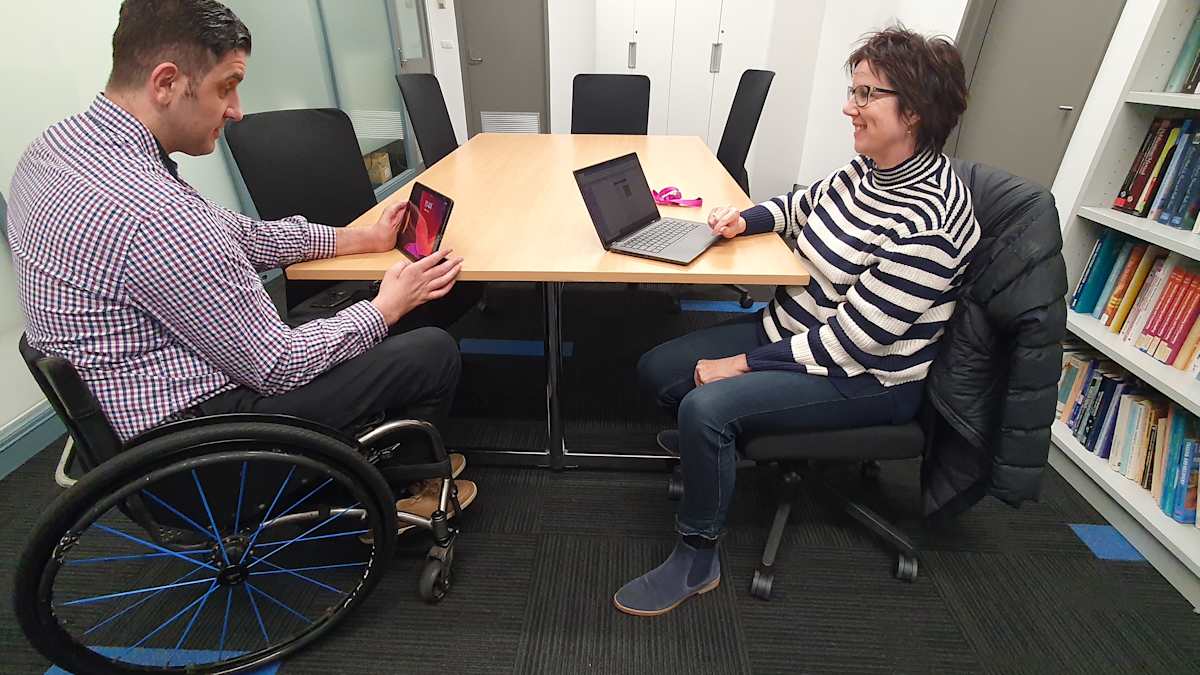
What is one defining moment in your career that shaped the way you lead today?
I don’t think I’ve had one single defining moment in my leadership journey. Instead, I’ve been shaped by the people who have led me – mentors and excellent leaders I’ve had over the years.
The qualities I most admire and try to emulate include humility, quiet confidence, and a deep commitment to their roles and to the people they lead.
These leaders didn’t need to make a lot of noise or seek attention; instead, they inspired their teams by genuinely supporting them, recognising individual strengths, and creating inclusive and collaborative work environments. Their ability to lead with authenticity and bring others along with them has significantly influenced the way I lead.
What advice would you give to women aspiring to lead in your field?
Lead in an area you’re passionate about, something that resonates deeply with you and motivates you. Leadership driven purely by ambition can lead to burnout and hollow achievements.
For me, that passion has always been social inclusion for people with disabilities, especially those with spinal cord injuries. When you're committed to a meaningful cause, it becomes easier to inspire and motivate others.
It’s also vital to maintain balance in life. Leadership can come with personal costs, so taking care of yourself and finding fulfillment outside of work – through hobbies, family, friends – is essential. Nurturing these parts of your life helps replenish your energy and sustain your leadership over the long term.
Who is a woman who has inspired you, and why?
One of the women who has inspired me most is Dian Fossey. She originally trained as an occupational therapist, but became world-renowned for her conservation work with mountain gorillas in the Virunga Mountains of Africa. Her journey from healthcare to activism showed incredible courage, determination, and lifelong commitment to protecting a vulnerable population.
One of her quotes that resonates deeply with me is: “When you realise the value of all life, you draw less on what has passed and concentrate more on the preservation of the future.”
Although she was speaking about animals, this sentiment speaks to the heart of my work in advocating for the social inclusion of people with disabilities. Her life reminds me of the importance of valuing all individuals in society, and striving for a more inclusive future.





